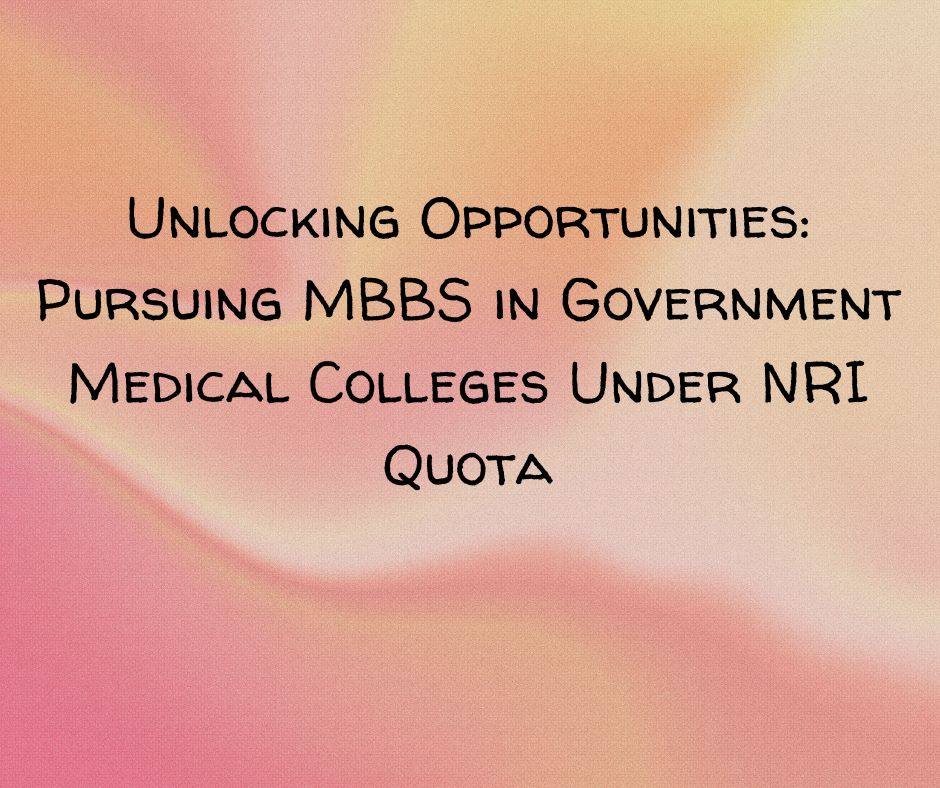Best and Affordable Medical Universities Abroad for Indian Students Pursuing an MBBS degree abroad has…
Unlocking Opportunities: Pursuing MBBS in Government Medical Colleges Under NRI Quota
![]()
Unlocking Opportunities: Pursuing MBBS in Government Medical Colleges Under NRI Quota
 In the vast landscape of medical education, aspiring doctors often find themselves navigating a labyrinth of choices and considerations. One option that’s been increasingly gaining traction is pursuing an MBBS degree in government medical colleges under the NRI quota. This avenue offers a unique blend of quality education, diverse experiences, and promising career prospects. In this blog, we’ll delve into what this option entails, its advantages, challenges, and essential insights for those considering this path.
In the vast landscape of medical education, aspiring doctors often find themselves navigating a labyrinth of choices and considerations. One option that’s been increasingly gaining traction is pursuing an MBBS degree in government medical colleges under the NRI quota. This avenue offers a unique blend of quality education, diverse experiences, and promising career prospects. In this blog, we’ll delve into what this option entails, its advantages, challenges, and essential insights for those considering this path.
Understanding the NRI Quota:
The NRI (Non-Resident Indian) quota is a provision in many government medical colleges in India, specifically earmarked for Non-Resident Indians, Persons of Indian Origin (PIOs), and Overseas Citizens of India (OCIs). This quota typically reserves a certain percentage of seats in medical colleges for eligible candidates from these categories.
Advantages of Pursuing MBBS Under NRI Quota:
- Quality Education: Government medical colleges are renowned for their high standards of education, infrastructure, and faculty. Opting for the NRI quota ensures access to this quality education.
- Lower Fees: While studying medicine can be expensive, especially for international students, the NRI quota often offers tuition fees at par with those for Indian students, or sometimes slightly higher. This is significantly lower compared to private medical colleges.
- Diverse Learning Environment: Being part of the NRI quota exposes students to a diverse cohort of peers from various cultural backgrounds. This enriches the learning experience and fosters cultural exchange.
- Global Exposure: Studying in India under the NRI quota provides exposure to the country’s healthcare system and diverse patient demographics, which can be invaluable for a future medical career, whether in India or abroad.
Challenges and Considerations:
- Eligibility Criteria: While the NRI quota offers opportunities, candidates must meet specific eligibility criteria, which may vary across institutions. These criteria often include proof of NRI status, academic qualifications, and sometimes even language proficiency tests.
- Competitive Nature: The NRI quota is highly competitive, with a limited number of seats available. As such, candidates must demonstrate academic excellence and often need to clear entrance examinations, such as NEET (National Eligibility cum Entrance Test).
- Cultural Adjustment: Moving to a new country for education can present challenges related to cultural adaptation, language barriers, and adjusting to a different academic environment. However, many institutions offer support services to facilitate this transition.
- Residency Requirements: Some countries have specific residency requirements for graduates of foreign medical programs to practice medicine locally. It’s crucial for students to research and understand these requirements before committing to a particular educational path.
Essential Insights for Aspiring Candidates:
- Research Extensively: Thoroughly research the NRI quota policies and admission processes of various government medical colleges to identify the best-fit options based on your eligibility, preferences, and career goals.
- Prepare Diligently: Given the competitive nature of admissions, diligent preparation for entrance examinations such as NEET is essential. Seek guidance from mentors, enroll in preparatory courses, and practice consistently to maximize your chances of success.
- Plan Finances Wisely: While studying under the NRI quota may offer lower tuition fees compared to private colleges, it’s essential to plan your finances meticulously, considering additional expenses such as accommodation, living costs, and travel.
- Seek Support Networks: Establishing a support network of fellow students, faculty members, and alumni can greatly aid in navigating challenges and maximizing your learning experience during your MBBS journey.
Conclusion:
Pursuing MBBS in government medical colleges under the NRI quota presents a compelling opportunity for aspiring doctors seeking quality education, diverse experiences, and promising career prospects. While it comes with its set of challenges and considerations, thorough research, diligent preparation, and strategic planning can empower candidates to embark on this enriching educational journey with confidence. As the world continues to embrace global perspectives in healthcare, the NRI quota stands as a gateway to unlocking a world of possibilities in the field of medicine.





